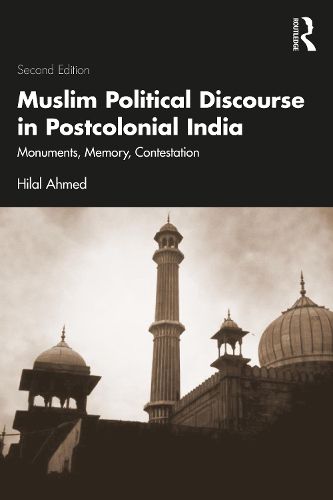Readings Newsletter
Become a Readings Member to make your shopping experience even easier.
Sign in or sign up for free!
You’re not far away from qualifying for FREE standard shipping within Australia
You’ve qualified for FREE standard shipping within Australia
The cart is loading…






This book explores the process of monumentalisation of Indo-Islamic historical places and their remaking as political sites in contemporary India situating these within the Muslim political discourse.
It studies the process through which various monuments such as the Jama Masjid in Delhi and the Babri Masjid in Ayodhya became 'political sites' many decades after independence and the modes by which a memory of a royal Muslim past was articulated for political mobilisation. It analyses the histories of these archaeological monuments, their function, their status as living memories and as heritage, emerging Muslim religiosities and the internal configurations of Muslim politics in India. This new edition also explores the aftermath of the Supreme Court verdict of the Babri Masjid-Ram Janmabhoomi land title dispute and the Hindutva politics of heritage.
Raising critical questions such as whether Muslim responses to political questions are homogenous, the book will greatly interest researchers and students of political science, modern Indian history, sociology, as well as the general reader interested in contemporary India.
$9.00 standard shipping within Australia
FREE standard shipping within Australia for orders over $100.00
Express & International shipping calculated at checkout
This book explores the process of monumentalisation of Indo-Islamic historical places and their remaking as political sites in contemporary India situating these within the Muslim political discourse.
It studies the process through which various monuments such as the Jama Masjid in Delhi and the Babri Masjid in Ayodhya became 'political sites' many decades after independence and the modes by which a memory of a royal Muslim past was articulated for political mobilisation. It analyses the histories of these archaeological monuments, their function, their status as living memories and as heritage, emerging Muslim religiosities and the internal configurations of Muslim politics in India. This new edition also explores the aftermath of the Supreme Court verdict of the Babri Masjid-Ram Janmabhoomi land title dispute and the Hindutva politics of heritage.
Raising critical questions such as whether Muslim responses to political questions are homogenous, the book will greatly interest researchers and students of political science, modern Indian history, sociology, as well as the general reader interested in contemporary India.